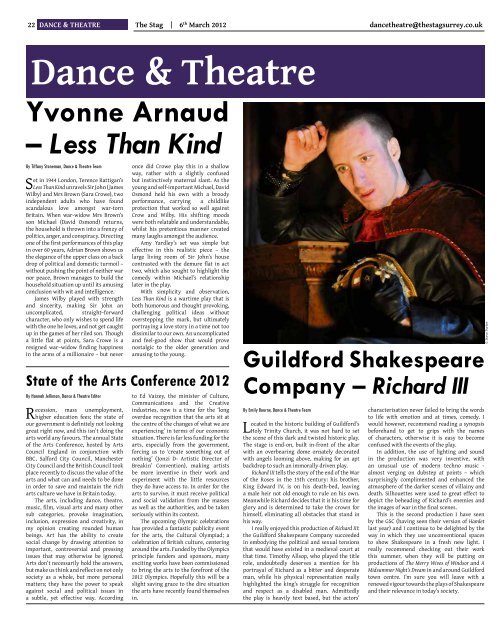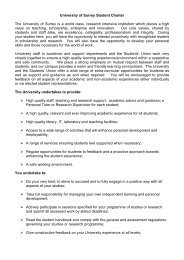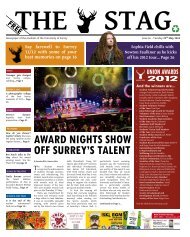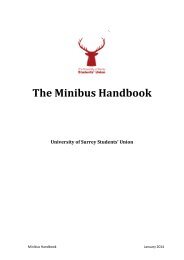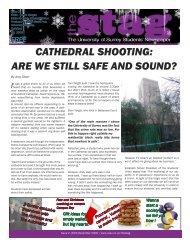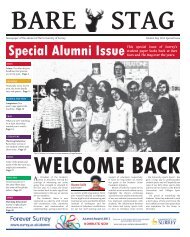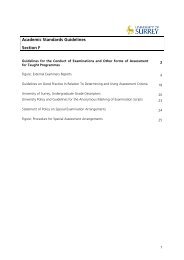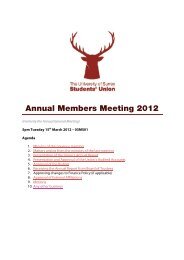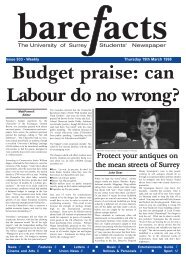Issue 43 - University of Surrey's Student Union
Issue 43 - University of Surrey's Student Union
Issue 43 - University of Surrey's Student Union
Create successful ePaper yourself
Turn your PDF publications into a flip-book with our unique Google optimized e-Paper software.
22 DANCE & THEATRE The Stag | 6 th March 2012 dancetheatre@thestagsurrey.co.uk<br />
Dance & Theatre<br />
Yvonne Arnaud<br />
– Less Than Kind<br />
By Tiffany Stoneman, Dance & Theatre Team<br />
Set in 1944 London, Terence Rattigan’s<br />
Less Than Kind unravels Sir John (James<br />
Wilby) and Mrs Brown (Sara Crowe), two<br />
independent adults who have found<br />
scandalous love amongst war-torn<br />
Britain. When war-widow Mrs Brown’s<br />
son Michael (David Osmond) returns,<br />
the household is thrown into a frenzy <strong>of</strong><br />
politics, anger, and conspiracy. Directing<br />
one <strong>of</strong> the first performances <strong>of</strong> this play<br />
in over 60 years, Adrian Brown shows us<br />
the elegance <strong>of</strong> the upper class on a back<br />
drop <strong>of</strong> political and domestic turmoil –<br />
without pushing the point <strong>of</strong> neither war<br />
nor peace, Brown manages to build the<br />
household situation up until its amusing<br />
conclusion with wit and intelligence.<br />
James Wilby played with strength<br />
and sincerity, making Sir John an<br />
uncomplicated, straight–forward<br />
character, who only wishes to spend life<br />
with the one he loves, and not get caught<br />
up in the games <strong>of</strong> her riled son. Though<br />
a little flat at points, Sara Crowe is a<br />
resigned war–widow finding happiness<br />
in the arms <strong>of</strong> a millionaire – but never<br />
once did Crowe play this in a shallow<br />
way, rather with a slightly confused<br />
but instinctively maternal slant. As the<br />
young and self-important Michael, David<br />
Osmond held his own with a broody<br />
performance, carrying a childlike<br />
protection that worked so well against<br />
Crow and Wilby. His shifting moods<br />
were both relatable and understandable,<br />
whilst his pretentious manner created<br />
many laughs amongst the audience.<br />
Amy Yardley’s set was simple but<br />
effective in this realistic piece – the<br />
large living room <strong>of</strong> Sir John’s house<br />
contrasted with the demure flat in act<br />
two, which also sought to highlight the<br />
comedy within Michael’s relationship<br />
later in the play.<br />
With simplicity and observation,<br />
Less Than Kind is a wartime play that is<br />
both humorous and thought provoking,<br />
challenging political ideas without<br />
overstepping the mark, but ultimately<br />
portraying a love story in a time not too<br />
dissimilar to our own. An uncomplicated<br />
and feel-good show that would prove<br />
nostalgic to the older generation and<br />
amusing to the young.<br />
State <strong>of</strong> the Arts Conference 2012<br />
By Hannah Jelliman, Dance & Theatre Editor<br />
Recession, mass unemployment,<br />
higher education fees; the state <strong>of</strong><br />
our government is definitely not looking<br />
great right now, and this isn’t doing the<br />
arts world any favours. The annual State<br />
<strong>of</strong> the Arts Conference, hosted by Arts<br />
Council England in conjunction with<br />
BBC, Salford City Council, Manchester<br />
City Council and the British Council took<br />
place recently to discuss the value <strong>of</strong> the<br />
arts and what can and needs to be done<br />
in order to save and maintain the rich<br />
arts culture we have in Britain today.<br />
The arts, including dance, theatre,<br />
music, film, visual arts and many other<br />
sub categories, provoke imagination,<br />
inclusion, expression and creativity, in<br />
my opinion creating rounded human<br />
beings. Art has the ability to create<br />
social change by drawing attention to<br />
important, controversial and pressing<br />
issues that may otherwise be ignored.<br />
Arts don’t necessarily hold the answers,<br />
but make us think and reflect on not only<br />
society as a whole, but more personal<br />
matters; they have the power to speak<br />
against social and political issues in<br />
a subtle, yet effective way. According<br />
to Ed Vaizey, the minister <strong>of</strong> Culture,<br />
Communications and the Creative<br />
industries, now is a time for the ‘long<br />
overdue recognition that the arts sit at<br />
the centre <strong>of</strong> the changes <strong>of</strong> what we are<br />
experiencing’ in terms <strong>of</strong> our economic<br />
situation. There is far less funding for the<br />
arts, especially from the government,<br />
forcing us to ‘create something out <strong>of</strong><br />
nothing’ (Jonzi D- Artistic Director <strong>of</strong><br />
Breakin’ Convention), making artists<br />
be more inventive in their work and<br />
experiment with the little resources<br />
they do have access to. In order for the<br />
arts to survive, it must receive political<br />
and social validation from the masses<br />
as well as the authorities, and be taken<br />
seriously within its context.<br />
The upcoming Olympic celebrations<br />
has provided a fantastic publicity event<br />
for the arts, the Cultural Olympiad; a<br />
celebration <strong>of</strong> British culture, centering<br />
around the arts. Funded by the Olympics<br />
principle funders and sponsors, many<br />
exciting works have been commissioned<br />
to bring the arts to the forefront <strong>of</strong> the<br />
2012 Olympics. Hopefully this will be a<br />
slight saving grace to the dire situation<br />
the arts have recently found themselves<br />
in.<br />
Guildford Shakespeare<br />
Company – Richard III<br />
By Emily Bourne, Dance & Theatre Team<br />
Located in the historic building <strong>of</strong> Guildford’s<br />
Holy Trinity Church, it was not hard to set<br />
the scene <strong>of</strong> this dark and twisted historic play.<br />
The stage is end-on, built in-front <strong>of</strong> the altar<br />
with an overbearing dome ornately decorated<br />
with angels looming above, making for an apt<br />
backdrop to such an immorally driven play.<br />
Richard III tells the story <strong>of</strong> the end <strong>of</strong> the War<br />
<strong>of</strong> the Roses in the 15th century: his brother,<br />
King Edward IV, is on his death-bed, leaving<br />
a male heir not old enough to rule on his own.<br />
Meanwhile Richard decides that it is his time for<br />
glory and is determined to take the crown for<br />
himself, eliminating all obstacles that stand in<br />
his way.<br />
I really enjoyed this production <strong>of</strong> Richard III:<br />
the Guildford Shakespeare Company succeeded<br />
in embodying the political and sexual tensions<br />
that would have existed in a medieval court at<br />
that time. Timothy Allsop, who played the title<br />
role, undoubtedly deserves a mention for his<br />
portrayal <strong>of</strong> Richard as a bitter and desperate<br />
man, while his physical representation really<br />
highlighted the king’s struggle for recognition<br />
and respect as a disabled man. Admittedly<br />
the play is heavily text based, but the actors’<br />
characterisation never failed to bring the words<br />
to life with emotion and at times, comedy. I<br />
would however, recommend reading a synopsis<br />
beforehand to get to grips with the names<br />
<strong>of</strong> characters, otherwise it is easy to become<br />
confused with the events <strong>of</strong> the play.<br />
In addition, the use <strong>of</strong> lighting and sound<br />
in the production was very inventive, with<br />
an unusual use <strong>of</strong> modern techno music -<br />
almost verging on dubstep at points – which<br />
surprisingly complimented and enhanced the<br />
atmosphere <strong>of</strong> the darker scenes <strong>of</strong> villainy and<br />
death. Silhouettes were used to great effect to<br />
depict the beheading <strong>of</strong> Richard’s enemies and<br />
the images <strong>of</strong> war in the final scenes.<br />
This is the second production I have seen<br />
by the GSC (having seen their version <strong>of</strong> Hamlet<br />
last year) and I continue to be delighted by the<br />
way in which they use unconventional spaces<br />
to show Shakespeare in a fresh new light. I<br />
really recommend checking out their work<br />
this summer, when they will be putting on<br />
productions <strong>of</strong> The Merry Wives <strong>of</strong> Windsor and A<br />
Midsummer Night’s Dream in and around Guildford<br />
town centre. I’m sure you will leave with a<br />
renewed vigour towards the plays <strong>of</strong> Shakespeare<br />
and their relevance in today’s society.<br />
© Steve Porter


